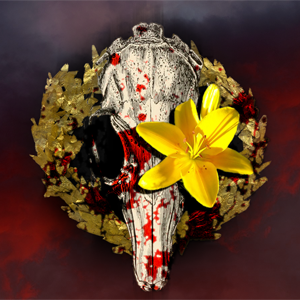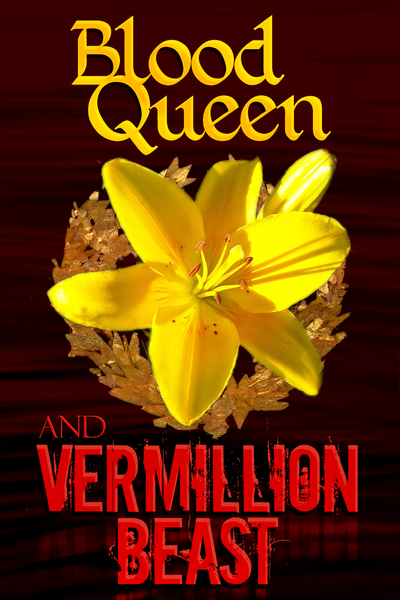Medin’s tobacco fields were brown and wilting, thick with weeds that encroached onto the roads and grew tall against the alderwood house. The woman herself sat on the salt-worn stoop of the house, yellow grass dress frayed at the skirt and the sleeves. Her muddy toes clenched and unclenched. At the sight of her Yven stopped, dread in her gut. She watched the woman’s toes and fingers, afraid she’d see the rhythm of a pulse in the twitching. But the rhythm wasn’t regular. It shifted and changed. Yven slowly realized the woman was humming a song, her little movements to the rhythm of the tune, not to a plagued heart.
Without looking up, Medin lifted her old voice, “I’m healthy enough, girl.”
Exhaling, Yven came closer. “I’m sorry. I’m not trying to sneak.” She let herself whimper when she said, “Your taskmaster took my sugar.”
“Hm?”
“My sugar. I came to trade. But he took it. And I don’t have anything now.”
Medin lifted her face. Her brown features were dirt-smudged, her lips lined and brow creased with age, blue eyes aglow but distant. She seemed to look beyond Yven, to someplace else. But she lifted her arms and beckoned, and Yven hurried forward to lean down and be embraced. Medin pet Yven’s azure hair. “There, there, little girl. You don’t need to bring me anything.”
“I was going to trade.” Yven sat down on the step in front of Medin. “For a mule. Just to borrow it. Someone stole our last mule and we have so much cane but we can’t mill it.”
Still petting Yven’s head, Medin smiled sadly. She didn’t say anything.
Watching the old woman for a moment, Yven looked at the tobacco fields again, their disrepair, the withered house, the open pens and empty coops. “Medin. Where is everyone?”
Medin’s petting hand stopped and shivered. “Sanguinate took ‘em.”
Yven sat up tall and grabbed Medin’s shaking fingers. “What?”
“Some noble bastard.” Medin’s voice cracked. “Some blood-drinking son of a bitch took my boys.”
In a drafty shed behind the house, the carcasses of three desiccated mules lay rotting where they’d been drained of their blood. Behind them lay the farmhand who’d come to check on them days ago, where he’d been laying ever since, where he’d remain laying until time wore him away. Outside, in the shadow of a lean-to, the last surviving mule hid from the sun and looked out over tobacco fields turning wild. In the simple way that animals can know things, can see things unseen, the mule watched doom lean its shadow over the farm.
*
Queen Aetha stared down on the Marble City from the high walls, surrounded by golden guards, Quil’al’nex at her side. She said, “There’s no wondering at the meaning behind those banners, is there?” and the answer was so obvious that Quil didn’t bother responding. So Aetha said, “Those vermillion banners are erected in front of businesses. Bring the owners of those businesses to me. I’ll set up a court in the square.”
Quil pivoted to look at the guards and said, “Don’t be nice. If anyone gets in the way, do as your instincts say.”
*
In one business, Allid’et’on sold traveling gear and preserved foodstuffs to people leaving the city. The square of three bridges opened not only to Amaranth, Encyclia, and Solandra, but also to the orchards and groves northeast of the city and the many ports of the city’s eastern bay. Revan was just across the sea, and he liked to watch what few cautious travelers braved the plagues to come and go. Allid himself no longer worked, twitching with plague as he was, but his sons were healthy. He liked to imagine some brave, plague-free girl from Revan traveling through, meeting one of his boys and falling for him at first sight, taking him safely away to Revan.
Allid was lost in reveries when he heard a rough voice say, “Who owns this business?”
And his son at the counter said, “Dad, why’s a guard asking after you?”
Eyes shooting open, Allid looked up at the golden guard, the gleaming sanguinate so out of place surrounded by all the simple ropes and leathers and dried meats of Allid’s stock. At first, Allid blinked in surprise. Then he glanced outside, at the wooden pole that leaned against his building, the vermillion banner waving upon it. Allid paled, looked at the man, “But it’s just colored cloth.”
The golden guard sneered. “Nothing is ever just what it is. Time to go.” He didn’t bother asking, just grabbing Allid by his shirt and pulling him up. With the plague thickening his blood and stiffening his body, Allid couldn’t help the pained groan at the sudden movement.
“Don’t hurt him!” Allid’s son vaulted the counter, rushing over. “What are you doing? He can walk! Put him down!”
That was all it took for a second guard to step in, grab the boy, bear him against the shelves and counters. Allid didn’t see what happened after that, just yelling, “Get off my boy!” as he was dragged outside. He heard yelling, shouting, bellowing.
In the square, against the white pillar from which the banner of Al’ain waved over the city, laborers had been compelled to place a heavy white chair wreathed in gleaming alder leaves. There Queen Aetha sat, watching impatiently as golden guards tore business-owners from shops around the square and forced them to kneel before her. For Allid, kneeling was painful. His plagued body didn’t want to bend that way, his knees revolting and only giving way with bitter flares of torment that shot through his veins. He wailed as they forced him down, bowed him before his Queen.
Aetha scowled at him. Her hair was like a mane of gleaming blood around her face. “What a horrible sound. The cry of weakness.”
Panting from the pain, Allid looked at the people forced to kneel around him. Nine of his neighbors. People he’d worked alongside for decades or years, and at least one young man who had only just taken over his business from his father. They’d spoken of the vermillion banners the night before, smiled at the impulse, the dare of it. A harmless gesture, but oh, they should’ve known. When he found his voice, Allid snarled at the queen, “Weakness? We work every day in more pain than you’ve felt in your life!”
“It dares to speak,” Aetha said, almost with a chuckle. She leaned forward in her seat, golden brooches and epaulets shining in the light of sunlike trees and the glowing fountain in the city’s center. “I am not lightly called the Champion of the Feral Fields nor the eradicator of Ossea. War, carnage, pain, and death are all things I am no stranger to. Your sickness doesn’t even kill you, yet hear how you wail.”
“We’ve heard you cry likewise.” Allid turned a glare on his queen. “Like you cried out days past when the red warrior got your better.”
“You speak of the Vermillion Beast. I won that. Captured the creature.” She smirked. “And it bent to my wishes readily enough once it was in chains.”
“Hah!” Allid forced a pained, mocking laugh through his tormented throat, feeling his plagued chest seize with every beat of his heart. The others kneeling around him watched in horror, the golden guards in disbelief. It made Allid bold. “You fell. Your own guards tried to eat you. The red warrior escaped the dungeon! You hate the banners because they remind you that you’re the weak one. The one leading us to ruin. Not us. You!”
Aetha’s smile vanished. Maybe she didn’t realize that the rumors of the beast’s escape had gotten out. She looked over the gathered business-owners. Ten of them, one for each banner in the square. “I see. Oh, yes, I see. It confused you to see me do battle with a worthy opponent. Disillusioned, are you? Oh, what a small spirit you must have.” She stood and walked toward Allid, looking down on him as she said, “Fearful animal. In need of reassurance. Or better training.”
Through gritted teeth, Allid shouted loud, “My sons are not your livestock!” so that his voice echoed through the square. Everything had gotten so quiet. Workers, passersby, soldiers alike, all staring.
Metal sang through the air, and Aetha caught the knife by its blade before it hit her face. Red splattered across her clothes and face, blood running generously down her arm. The soldiers around her gasped and cast about, and Quil shouted for them to be still. Aetha stared at the blade she’d caught, some fisherman’s knife thrown at her from the crowd she’d barely looked at. She watched the blood carefully. Not her own. The knife had been coated in it.
Her gaze looked past the blade to the crowd. A ragged pauper in the back, thin with starvation, stared at her with venom.
“I see,” Aetha whispered, then lifted her voice. “Quil, please plan a hunting trip to the mainland. It’s been too long since we’ve brought in fresh stock, and we’re about to have an underpopulation problem.”











Comments (0)
See all